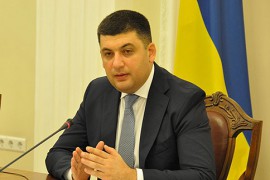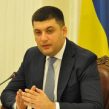
Berlin, Paris Seek Constitutional Status for Donetsk-Luhansk in Ukraine
Publication: Eurasia Daily Monitor Volume: 12 Issue: 134
By:

Twice in recent days (July 10 and 14), German Chancellor Angela Merkel and French President François Hollande have jointly demarched Kyiv to, first, legalize the Donetsk-Luhansk authorities in Ukraine’s constitution, and next, to legitimize those authorities through local elections in those territories. Moscow has been airing similar demands publicly. But the Kremlin has not (at least not officially) contacted Ukraine’s leadership by telephone to press those demands recently. Instead, Merkel and Hollande have been working the phones toward that end.
In their conference call with Poroshenko on July 10, Merkel and Hollande welcomed the “start of the constitutional reform, aiming for Ukraine’s decentralization.” However, that reform must be “in conformity with the Minsk package, and refer to the special status of certain areas of Donetsk and Luhansk in the draft constitution.” The French (usually more impatient than the Germans regarding Ukraine) added a “particular emphasis on the special status” in the official readout of the presidential conference call (Bundesregierung.de, Elysee.fr, July 10).
The Ukrainian presidential office, however, omitted the point about “special status” from its press release of the conference call (Ukrinform, July 11). The omission was a sign of resistance. Poroshenko had informed the parliament and the country on July 1, correctly, that the term “special status” did not occur in the constitutional draft; instead, the term “procedures for local administration” is used, and not in the body of the text (where it would hold binding value), but in the transitory provisions of a relevant ordinary law (non-binding, and conditional on the unlikely prospect of democratic elections in those Russian-controlled “certain districts”). The Merkel-Hollande call had clearly attempted to pressure Poroshenko to back down on those points.
On July 14, Merkel and Hollande returned to the telephone, this time with the Ukrainian parliament’s chairman Volodymyr Hroisman, who concurrently chairs Ukraine’s Constitutional Commission. Repeating the unilateral interpretation from their preceding call, about a constitutional special status for Donetsk and Luhansk, Merkel and Hollande added a demand and a warning: “In the interest of a long-term stabilization in Ukraine’s east, and to preserve the country’s territorial integrity, they [Merkel and Hollande] would particularly welcome an understanding to be reached between the parties [Kyiv and Donetsk-Luhansk] about further progress on the constitutional reform and the upcoming local elections” (Bundesregierung.de, July 14; Elysee.fr, July 14).
That language seemed designed to imply that Kyiv would be on its own, unless it starts negotiating with Donetsk and Luhansk about their special status and elections to be held there. A start to that direct negotiation is Moscow’s first and foremost demand in the current phase of the Minsk process. Chairman Hroisman’s office omitted those contentious remarks from its press release on that conference call, as Poroshenko had done and for the same reasons (see above). While Hollande and Merkel spoke of de-centralization as a Ukrainian obligation under the Minsk agreement, Hroisman spoke of it as a Ukrainian reform initiative, with no reference to Minsk (Rada.gov.ua, July 14; Ukrinform, July 15). It seems in any case strange for heads of executive power to interfere with the constitutional process of another country’s democratically elected parliament; all the more after failing to sway that same country’s president (who also happens to be Hroisman’s party-political chief).
Berlin and Paris proved quick to react to Ukraine’s recent decisions on administrative-territorial decentralization (July 1) and on local elections (July 14).
The constitutional amendments on decentralization, unveiled by Poroshenko on July 1, and due for parliamentary approval by August, preclude legalizing the current Donetsk-Luhansk authorities in any form. Transitory provisions, however, envisage that “specific procedures of local self-administration in certain districts of the Donetsk and Luhansk provinces” are defined by a relevant ordinary Ukrainian law (see EDM, July 10). This mechanism would break the link that the Minsk armistice imposed between a settlement of the Russia-Ukraine war and an internal Ukrainian constitutional settlement. Merkel’s and Hollande’s interventions by telephone aspparently sought to reinstate that link.
The law on local elections, adopted by the Ukrainian parliament on July 14, provides the legal basis for holding local elections on October 25 throughout the country, except in Crimea and the Donetsk-Luhansk territories under Russian control. The law’s transitory provisions ascertain the fact that Ukrainian law and democratic election standards are impossible to uphold in those territories (Rada.gov.ua, July 14; Ukrinform, July 15). This makes clear that Ukraine will not consent to legitimizing fake elections there
The secessionist authorities have announced plans to stage elections there separately from, but simultaneously with Ukraine’s October 25 elections (see EDM, July 9). Berlin and Paris, however, are interested in Donetsk-Luhansk elections to be held by agreement with Kyiv and the Organization for Security and Cooperation in Europe (OSCE). Elections, if validated, would qualify the Donetsk and Luhansk authorities for a legal status vis-à-vis the rest of Ukraine, though under de facto military protection of Russia, which (under the Minsk armistice) holds all levers with no obligations. And this would place Donetsk-Luhansk, fronting for Russia, in an impregnable position to challenge Kyiv to hold direct negotiations for the “full implementation of the Minsk agreement.”




